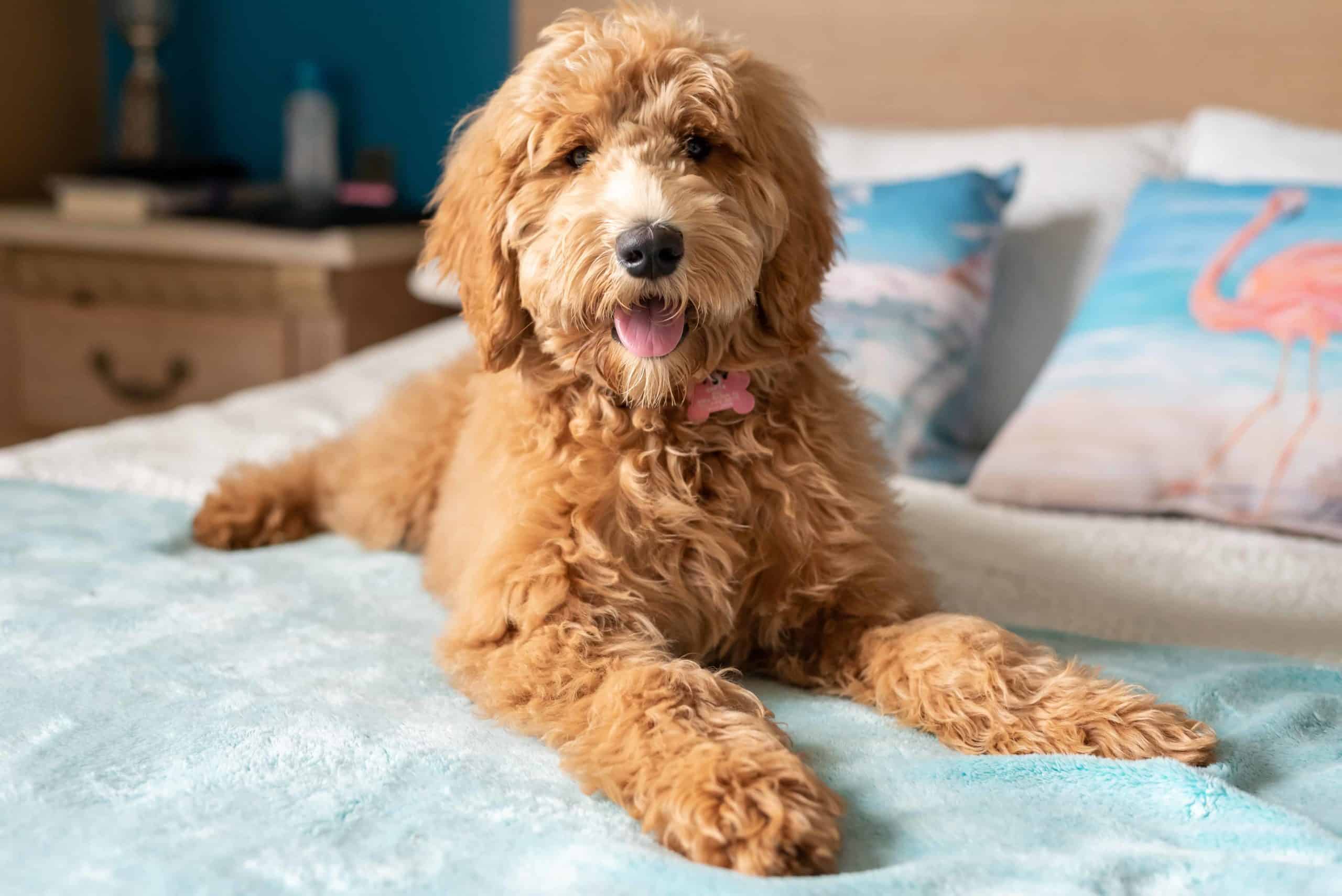How To Take Care Of Goldendoodle Dog?
Goldendoodle dogs, the adorable crossbreed between a Golden Retriever and a Poodle, have received massive recognition as family pets in recent years. Their friendly nature, intelligence, and hypoallergenic coats make them the top choice for dog lovers. The Goldendoodle dog is the perfect combination of intelligence and charm. However, like all dogs, Goldendoodle dogs require proper care and attention to thrive. Moreover, in this comprehensive guide, we will explore the proper ways for you to understand ‘How To Take Care Of Goldendoodle Dog’ and try to make your dog’s life happy and healthy.
It’s important to know about the key features of your pet to take proper care so here we will discuss them in detail.
A Glimpse into Goldendoodle Dog’s History:
The Goldendoodle dog tale starts in the late twentieth century when breeders aimed to create a hypoallergenic guide dog. The reason behind this endeavor was to develop a breed suitable for individuals with allergies, specifically those who required a reliable guide dog. Moreover, combining the hypoallergenic coat of the Poodle with the gentle temperament of the Golden Retriever was a brilliant solution, giving rise to the Goldendoodle dog.
This hybrid breed quickly gained popularity, not only for their hypoallergenic qualities but also for their intelligence, friendliness, and adaptability. Goldendoodle dogs soon became treasured family pets, therapy dogs, and service animals. Their ability to bond closely with their owners and their eagerness to please make them a joy to be around.
Characteristics of Goldendoodle Dog:
Size Of Goldendoodle Dog:
Goldendoodle dogs come in various sizes, thanks to the diversity in Poodle sizes. There are three main categories:
Standard Goldendoodle Dog:
Weighing between 45 to 100 pounds and standing 20 to 24 inches tall at the shoulder, standard Goldendoodle dogs are the largest of the breed. Moreover, they are often bred from Standard Poodles and Golden Retrievers.
Medium Goldendoodle Dog:
Medium Goldendoodle dogs fall in the 30 to 45-pound range, with a height of 17 to 20 inches. Furthermore, they are typically bred from Miniature Poodles and Golden Retrievers.
Miniature Goldendoodle Dog:
Miniature Goldendoodle dogs are the smallest, weighing around 15 to 30 pounds and standing 13 to 17 inches tall. They are often the result of breeding Miniature Poodles with Golden Retrievers.
Life Span Of Goldendoodle Dog:
The lifespan of a Goldendoodle dog can vary depending on several factors, including genetics, size, and overall health. On average, Goldendoodle dogs typically live between 10 to 15 years. However, it’s essential to note that some Goldendoodles may live longer, while others may have shorter lifespans due to various factors.
Genetics Of Goldendoodle Dog:
Genetics plays a significant role in determining a dog’s lifespan. Responsible breeders aim to produce Goldendoodle dogs with good genetic health by carefully selecting parent dogs with fewer inherited health issues.
Size:
The size of a Goldendoodle dog can impact its lifespan. Smaller Goldendoodle dogs, such as Miniature or Toy Goldendoodle dogs, tend to have longer lifespans than larger ones. Larger dogs often have shorter lifespans and may be more prone to certain health issues.
Healthcare Of Goldendoodle Dog:
Regular veterinary care, including vaccinations, preventive measures like flea and tick control, and dental care, can contribute to a longer and healthier life for your Goldendoodle dog.
Diet and Exercise:
Providing a well-balanced diet and regular exercise is essential for maintaining your Goldendoodle dog’s overall health and can influence its lifespan.
Genetic Health Issues:
While Goldendoodle dogs are often bred for hybrid vigor, they can still inherit health issues from their parent breeds. Common health concerns in Goldendoodle dogs may include hip dysplasia, elbow dysplasia, certain eye conditions, and allergies.
Environmental Factors:
Environmental factors, such as exposure to toxins and accidents, can also impact a Goldendoodle dog’s lifespan.
Coat:
One of the standout features of Goldendoodle dogs is their coat, which can vary greatly depending on genetics. These dogs can have curly, wavy, or straight hair. Moreover, coat colors range from cream and apricot to red and chocolate, with some even having a black coat. The good news for allergy sufferers is that Goldendoodle dogs often have a low-shedding, hypoallergenic coat, making them a fantastic choice for families with allergies.
As we have discussed your Goldendoodle dogs’ key characteristics and history, we will now delve into the steps to take care of your dog.
Ways To Take Care Of Goldendoodle Dog:
Preparing for Your Goldendoodle Dog:
Research the Breed Of Goldendoodle Dog:
Goldendoodle dogs come in various sizes, coat types, and temperaments. Some may have more Poodle-like characteristics, while others may lean towards the Golden Retriever side. It’s crucial to understand these variations and choose a Goldendoodle dog that aligns with your preferences and lifestyle. For instance, if you have allergies, look for a Goldendoodle dog with a curlier, more Poodle-like coat.
Find a Reputable Breeder or Rescue:
A reputable breeder will provide you with health clearances for the puppy’s parents, ensuring that they have been screened for genetic health issues. They should also be open to questions and provide a clean, caring environment for their dogs. When adopting from a rescue organization, inquire about the dog’s history, including any behavioral challenges or past traumas. This information will help you better meet your dog’s needs.
Prepare Your Home:
Goldendoodle Dogs are typically adaptable and well-suited to both apartments and houses. However, you should take steps to dog-proof your living space. Install child gates if necessary, secure trash cans, and keep hazardous items out of reach.
Puppy-Proof Your Space:
Puppies are curious and like to explore, which can sometimes lead to accidents. Ensure that you’ve secured or removed any potential hazards. Keep electrical cords out of reach, lock cabinets containing chemicals, and use safety latches on doors to rooms you want to keep off-limits.
Goldendoodle Dog Nutrition:
Choose the Right Food For Goldendoodle Dog:
Consult with your veterinarian to select the best food for your Goldendoodle dog. Consider factors like age, size, activity level, and any allergies or sensitivities. High-quality commercial dog food is typically a good choice, but your vet may recommend a specialized diet for specific health concerns.
Portion Control:
Overfeeding can lead to obesity, which is a common problem in Goldendoodle dogs. Moreover, follow the recommended portion sizes on the dog food packaging, and adjust based on your dog’s age and activity level. Monitor their weight and adjust portions as necessary.
Fresh Water For Goldendoodle Dog:
Proper hydration is essential for your Goldendoodle dog’s health. Ensure they always have access to fresh, clean water.Additionally, clean and refill their water bowl regularly to prevent bacterial growth.
Exercise and Mental Stimulation Of Goldendoodle Dog:
Daily Exercise Of Goldendoodle Dog:
Goldendoodle dogs are active dogs that require daily exercise to stay healthy and happy. Depending on their age and energy level, aim for at least 30 minutes to an hour of physical activity each day. Regular walks, playtime in the yard, or trips to a dog park are great ways to keep them active.
Mental Stimulation Of Goldendoodle Dog:
Goldendoodle dogs are intelligent dogs that thrive on mental challenges. Engage their minds with puzzle toys, interactive games, and obedience training. This mental stimulation not only prevents boredom but also strengthens the bond between you and your dog.
Grooming Of Goldendoodle Dog:
Brushing Your Goldendoodle Dog:
Goldendoodle dogs can have a range of coat types, from wavy to curly. Regardless of their coat, regular brushing is crucial to prevent mats and tangles. Brushing also distributes natural oils, keeping their coat healthy and shiny. Use a brush designed for your dog’s specific coat type.
Professional Grooming Of Your Goldendoodle Dog:
Depending on your Goldendoodle dog’s coat, you may need to schedule professional grooming appointments every 6-8 weeks. Groomers can trim their coats to the desired length, clean their ears, and check for any skin issues.
Bathing Of Goldendoodle Dog:
Bathing frequency depends on your dog’s activity level and coat type. Generally, a bath every 6-8 weeks is sufficient. So, use a dog-specific shampoo and conditioner to maintain their coat’s health and appearance.
Nail Trimming Of Goldendoodle Dog:
Regular nail trimming is essential to prevent overgrowth, which can cause discomfort and affect their gait. Additionally, if you’re unsure how to trim nails safely, ask your vet or a professional groomer for guidance.
Dental Care Of Goldendoodle Dog:
Oral hygiene is often overlooked but is critical for your Goldendoodle dog’s overall health. Brush their teeth regularly with a dog-friendly toothbrush and toothpaste. Dental chews and regular dental check-ups with your vet are also recommended.
Healthcare and Preventative Measures Of Goldendoodle Dog:
Veterinary Care:
Regular vet check-ups are essential to monitor your Goldendoodle dog’s health. Keep up with vaccinations, flea and tick prevention, and heartworm medication as recommended by your vet. Discuss any health concerns promptly.
Spaying/Neutering:
Consult your vet about the appropriate time for spaying or neutering your Goldendoodle dog. Moreover, this decision can impact their behavior, including territorial marking, and prevent unwanted litter.
Training and Socialization Of Goldendoodle Dogs:
Puppy Training:
Early training is crucial for a well-behaved Goldendoodle dog. Furthermore, basic commands like “sit,” “stay,” “come,” and “leave it” are fundamental for their safety and your peace of mind. Positive reinforcement techniques work best.
Socialization Of Goldendoodle Dog:
Expose your Goldendoodle dogs to various people, animals, and environments from a young age. So, this helps them develop into well-adjusted, confident dogs that are comfortable in different situations.
Loving Your Goldendoodle Dog:
Play and Bonding:
Playtime is not just about physical exercise; it’s also a chance to bond with your Goldendoodle dog. Engage in games they enjoy, whether it’s fetch, tug-of-war, or hide-and-seek. These interactions strengthen your connection and make your dog feel loved and cherished.
Affection:
Goldendoodle dogs thrive on affection and attention. Spend time petting and cuddling with your dog, and don’t forget to offer verbal praise. Moreover, regular physical contact helps them feel secure and happy.
Special Considerations:
Allergies:
While Goldendoodle dogs are often touted as hypoallergenic, individual reactions may vary. Monitor your family members for allergies, and consult an allergist if needed. Consider hypoallergenic bedding and air purifiers to mitigate potential allergens.
Separation Anxiety:
Goldendoodle dogs are known for their attachment to their owners and can be prone to separation anxiety. Gradually introduce them to alone time, and consider crate training to provide a sense of security when you’re not home.
Conclusion:
Caring for a Goldendoodle dog involves a combination of proper nutrition, regular grooming, exercise, and love and attention. Furthermore, by understanding their unique needs and providing them with a well-rounded care routine, you can ensure your Goldendoodle thrives and becomes a beloved member of your family. Remember, every Goldendoodle is an individual, so be flexible and adapt your care approach to meet their specific requirements for a happy and healthy life together.







